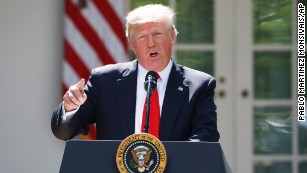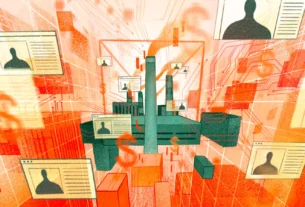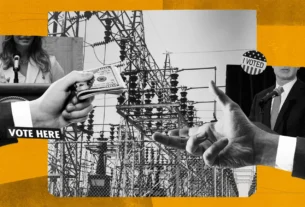
Washington (CNN)–President Donald Trump spent an hour Thursday talking about his commitment to economic growth and national stability as he announced the decision to back out of the Paris Climate Accord.Missing from his 2,000 word speech: any mention of climate change.
After famously calling climate change a “hoax” during the campaign, Trump has avoided the issue of increased man-made greenhouse gas emissions and their impact on global temperatures.
Asked Wednesday if Trump thinks human activity is contributing to climate change, White House press secretary Sean Spicer responded, “Honestly, I haven’t asked him that. I can get back to you.”
Two White House officials avoided similar questions at a background briefing with reporters after Trump’s speech Thursday. And EPA chief Scott Pruitt dodged the question in an interview with CNN’s Jake Tapper.”This is not about whether climate change is occurring or not,” Pruitt said on “The Lead.”
The pattern of the White House has been to turn away from the discussion of climate change without taking the step to argue directly that global warming isn’t real. Instead, there is an administration-wide reluctance to avoid the topic altogether.
In recent months, Trump proposed cutting the Environmental Protection Agency budget by more than 30%. EPA has challenged scientific findings on climate change — including by its own in-house scientists. And EPA cut climate information from its website.Former deputy EPA administrator under President Barack Obama, Bob Perciasepe, said the Trump administration’s avoidance of the term “just makes them seem out of touch with reality.”
“Climate change is happening, whether they speak about it or not,” said Perciasepe, who currently serves as president of the nonprofit Center for Climate and Energy Solutions. “You can’t make something not real if you just don’t talk about it. It doesn’t change reality — it’s just a way for them to de-emphasize something the rest of the world knows is going on.”
The examples are piling up.
On Wednesday, the White House declared June National Oceans Month and Great Outdoors Month. While the proclamations — a relatively standard annual designation — praised the US’s oceans and natural landscapes, the language clearly differed from Obama’s. Where Obama’s 2016 proclamations discussed the impacts of global warming, including drought and rising sea levels, Trump’s focused on energy production, fisheries management and tourism with no mention of climate change.
The administration has repeatedly circumvented any mention of those key little words.In April, the EPA removed all climate change information from its website, saying in a press release that language on the website is being updated to “reflect the approach of new leadership.”And the administration is adopting the same reasoning in press releases. Last month, the Interior Department released a study by the U.S. Geological Survey that highlighted the link between sea-level rise and global climate change. Except the release had one thing missing — any mention of climate change. Three of the study’s scientist authors told The Washington Post that they had to ultimately delete a line from the report that read “Global climate change drives sea-level rise, increasing the frequency of coastal flooding.”
Instead, the USGS release leaves the cause unmentioned. It begins: “The frequency and severity of coastal flooding throughout the world will increase rapidly and eventually double in frequency over the coming decades even with only moderate amounts of sea level rise.”
Uncertainty, but budget cuts to studies
A defense against believing humans are responsible for climate change is that scientific studies are not 100% certain — a stance frequently used by members of the Trump administration that muddles the scientific consensus that man-made emissions are driving global warming.
“I think that measuring with precision human activity on the climate is something very challenging to do, and there’s tremendous disagreement about the degree of impact,” Pruitt said in a CNBC interview in March. “So, no, I would not agree that it’s a primary contributor to the global warming that we see.”
While the White House may be against jumping to conclusions on the available scientific studies — with Pruitt even calling for more data from industry scientists — the administration has done little to back up those calls monetarily. In fact, instead of spending money to further study the effects and reality, or unreality of global warming — the administration has opted instead to cut much of the major funding that would go towards the studies.
“It is hypocritical,” said Andrew Rosenberg, director for the Center for Science and Democracy at the Union of Concerned Scientists. “They are complaining about uncertainty but at the same time increasing uncertainty by cutting back on ways to measure [climate change.]”
Climate change vs the economy
For many, the administration’s reluctance to deal with the idea of climate change comes down to one thought — that economic growth and climate awareness cannot go hand in hand.”This agreement is less about the climate and more about other countries gaining a financial advantage over the United States,” Trump said Thursday at the White House.Speaking specifically about the Paris deal Thursday, notable climate skeptic Sen. Jim Inhofe, R-Oklahoma, former chairman of the Senate Environment and Public Works Committee, told MSNBC, “[Paris] would be a huge job loss for America… I don’t know what would happen to our manufacturing base.”However, some experts argue instead that climate change is already benefiting the economy in the sense that it’s sparking economic innovation.
“The idea that they are operating on is that the US will be at a disadvantage if it deals with climate change. Most businesses would think that working on the climate issues can and has been creating jobs,” said Perciasepe. “It can strengthen United States company’s competitiveness in the global markets.
“Others argue, that whether or not the Trump administration agrees there is economic growth to be had through clean fuels and tech investment — the government is still putting the country at a disadvantage for not even acknowledging the possibilities of climate change.”In any other areas, in managing a business that would be considered a very stupid thing to do. Caring about your health, your own personal finances, no one would make decision that way,” said Rosenberg. “This is a manipulated campaign to try to avoid taking actions purely because it’s inconvenient for people to accept that truth because it might undermine their business model.”


